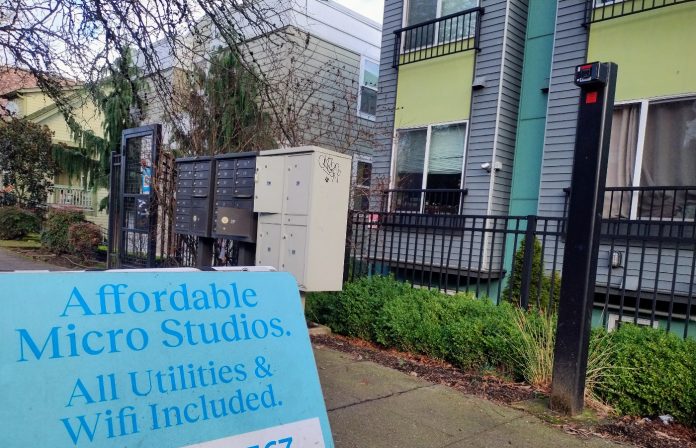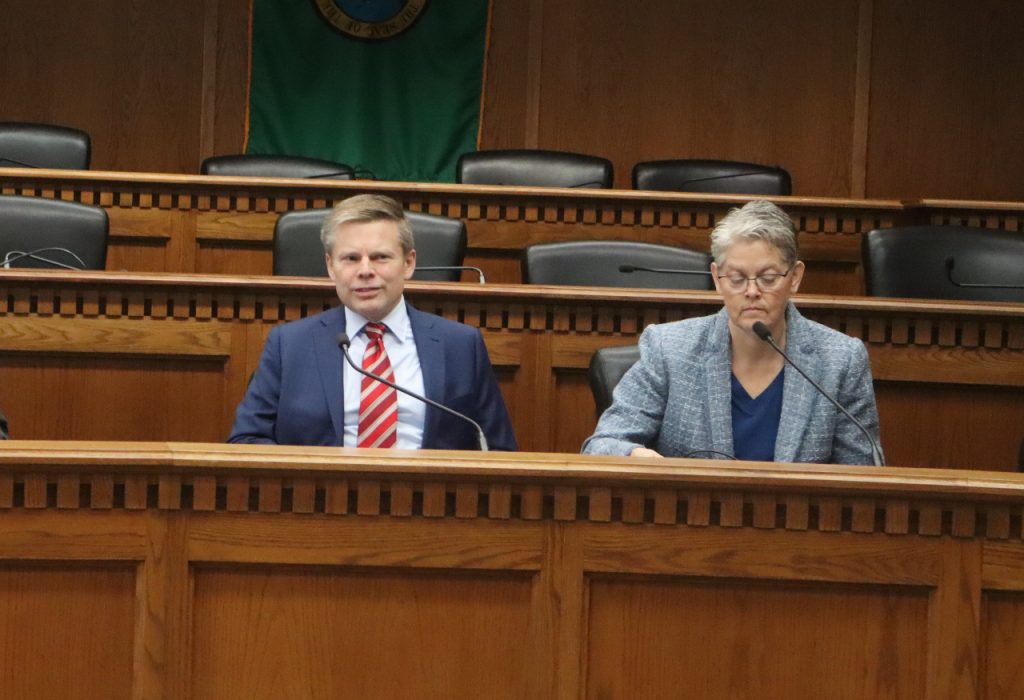
As the 2025 legislative session kicks off Monday, many Washington Democrats are returning to Olympia with a major piece of unfinished business at the top of their list: establishing a statewide cap on rent increases. While dozens of bills intended to increase the affordability of housing will be debated over the coming weeks, passing a statewide rent stabilization bill has emerged as a major priority for the caucus. There’s more momentum than ever behind the policy, which is being spearheaded by Rep. Emily Alvarado (D-34th, West Seattle).
While real estate industry advocates will almost certainly argue that the proposal will ultimately hurt tenants and discourage the construction of new housing, the supporters of this year’s rent stabilization bill believe they’ve struck the right balance between keeping people in their homes and encouraging development. Strict rent control regimes do not have a great track record and are maligned by most economists, but advocates say criticisms fall flat for rent stabilization, which is more measured and surgical.
Rent stabilization is popular with Washington voters. A recent Cascade PBS/Elway poll found that 68% of respondents backed the policy.
House Bill 1217 would cap annual rent increases at 7% and prohibit landlords from raising rent by any amount in the first year of tenancy. The bill exempts newly constructed apartments for their first 10 years, existing buildings that are less than 11 years old, public housing, and small rental arrangements, such as a homeowner who only rents out their accessory dwelling unit (ADU).
The proposal also caps all move-in fees and/or security deposits at the equivalent of one month’s rent, and limits fees on late rent to 1.5% of monthly rent, and requires six month’s notice on all rent increases over 3%.
“Excessive rent increases force renter households, including families, seniors, and young people, to lose housing opportunities,” the bill’s text reads. “Due to excessive rent increases, renter households are increasingly unable to afford housing in communities of opportunity and are being forced to move away from their communities. Renter households are forced to make tough and often impossible decisions between paying the rent and paying for other basic necessities such as medicine, child care, and transportation.”
In contrast with rent control policies in place in cities like New York City, rent stabilization doesn’t place any limits on the amount landlords can increase rent in between tenants, and allows landlords much more flexibility to increase annual rents underneath the overall cap.
The bill’s current language closely matches a bill Alvarado sponsored last year that passed the House by a comfortable 11-vote margin, with only four dissenting votes from within the Democratic caucus. It stalled in the state Senate’s Ways and Means Committee, along with a number of other progressive priorities, including allowing even-year local elections and transit-oriented development.
But in 2025, the Senate’s makeup is significantly different, and senators who had been frequent obstacles to policy advancing out of the powerful Ways and Means Committee, including Mark Mullet (D-5th, Issaquah) and Kevin Van De Wege (D-24th, Port Angeles), are no longer in the legislature. After introducing HB 1217 in the House, Alvarado is likely to join the Senate herself, with the departure of Sen. Joe Nguyen to head the state’s Department of Commerce. It is a very different chamber than it was just a few short months ago.

Jamie Pedersen (D-43, Capitol Hill), heading toward his first session as the Senate’s Majority Leader, framed the idea of stabilizing rents as being tied together with a need to pass bills that increase Washington’s overall housing supply.
“I suspect that we will have significant interest in our caucus, as there is among the House Democrats, in some form of rent stabilization,” Pedersen said last week at a pre-session press event. “We will be working at the same time to ensure that we pass a suite of measures that will help to encourage the production of additional housing for our state, because we understand that ultimately, there is no solution to the affordability crisis unless the private market is producing more housing than it has been.”
House Speaker Laurie Jinkins (D-21st, Tacoma) made it clear that the ball is in the Senate’s court. “We passed it off the floor of the House last year. We’ll pass it off the floor of the House this year,” Jinkins said.
A major outstanding question is whether the Senate will get on board with the 7% annual cap, or try and increase it. Last year, an amendment was put forward to increase the cap to 15%, with the exemption for new construction extended to 15 years, but that was not enough to ensure the policy advanced. Sen. Annette Cleveland (D-49th, Vancouver), ended up being the deciding vote against that change, somehow pushing back against the idea of rent stabilization overall while at the same time confusingly stating that a 15% cap is too high.
“I think there’s a general consensus with what’s happening to the rental market is messed up, people are struggling,” Sen. Yasmin Trudeau (D-21st, Tacoma), who has sponsored a Senate counterpart to Alvarado’s bill, SB 5222, told The Urbanist. “And so for me, the devil is now in the details, like now that you have all this momentum, what does it mean that we’re going to end up with?”
Many Democrats are pushing to ensure that Washington’s rent stabilization policy ends up roughly in line with policies in nearby states. Oregon limits annual rent increases to 7% plus the 12-month average change in the consumer price index (CPI), or 10%, whichever is lower. In times of high inflation, Oregon’s rent stabilization caps increases at 10%, while the cap would be slightly lower when inflation is below 3%. California, which also has some rent control regimes in force at the local level, has a similar statewide policy with a base limit of 5% plus the CPI inflation adjustment.
“I know that the advocates are really asking for 7%,” Trudeau said. “For me, it would be really terrible if we ended up with a bill that was worse for tenants than other similarly situated states.”
Some urbanists are likely to view rent stabilization skeptically, wary of adopting a policy that could inhibit housing growth by discouraging investors to fund projects in Washington. But one of the legislature’s most outspoken advocates around the issue of housing supply, Senator Jessica Bateman (D-22nd, Olympia), says the policy is already at a place where many of those concerns have been addressed.
“I’m very sensitive to the criticism that this could have an impact on supply,” Bateman told The Urbanist last week. “I think if it was rent control, it would be no argument from me whatsoever [that supply would be impacted]. I think there are dials in this bill that have worked to address some of those concerns. For instance, the 10-year moratorium on [applying rent stabilization to] new construction, that’s a direct compromise that was made by the sponsor in the House, resulting from conversations from the landlord community and the development community. We do not want to do anything that has us at an economic disadvantage in Washington state for the construction of housing.”
One of the four Democrats who voted against Alvarado’s bill in the House last year was Mike Chapman, who has since gone on to become a Senator in the seat formerly occupied by Van De Wege. But in a full reversal, Chapman has apparently come around on the idea of rent stabilization and is now a co-sponsor of Trudeau’s Senate bill.
“Most of us are one paycheck away, one lost job away, from not being able to afford housing,” Chapman said at a candidate forum last year in Port Angeles, contrasting his position with his opponent, Republican Marcia Kelbon, according to the Sequim Gazette. The Democratic caucus appears to be even more united than it was last year, but in the coming months, any hidden fractures on the issue will likely come to light — especially as the weight of the real estate lobby comes to bear.
The House’s Housing Committee is holding a hearing on HB 1217 on Monday January 13 at 1:30pm. You can submit your position on the bill here.
Ryan Packer has been writing for The Urbanist since 2015, and currently reports full-time as Contributing Editor. Their beats are transportation, land use, public space, traffic safety, and obscure community meetings. Packer has also reported for other regional outlets including BikePortland, Seattle Met, and PubliCola. They live in the Capitol Hill neighborhood of Seattle.

